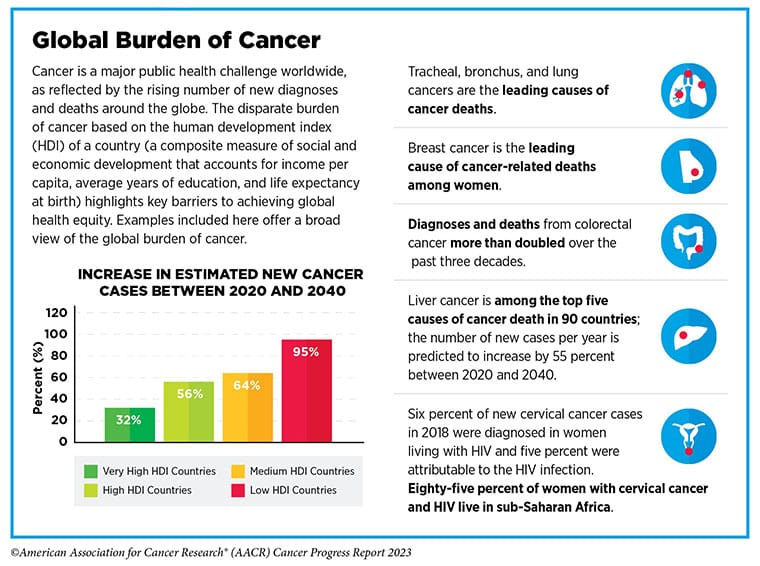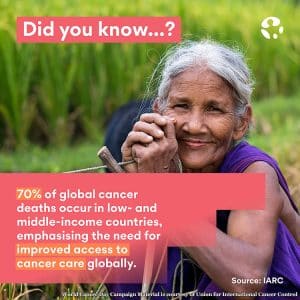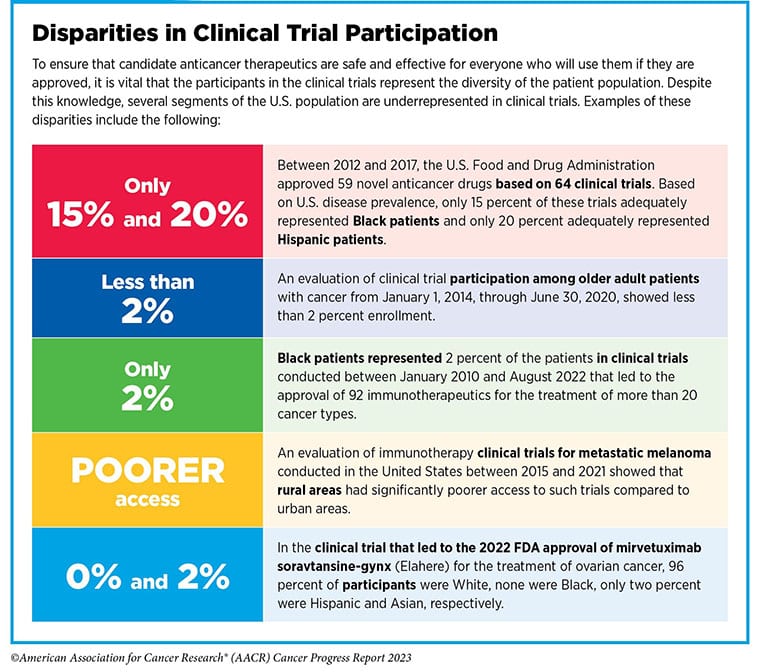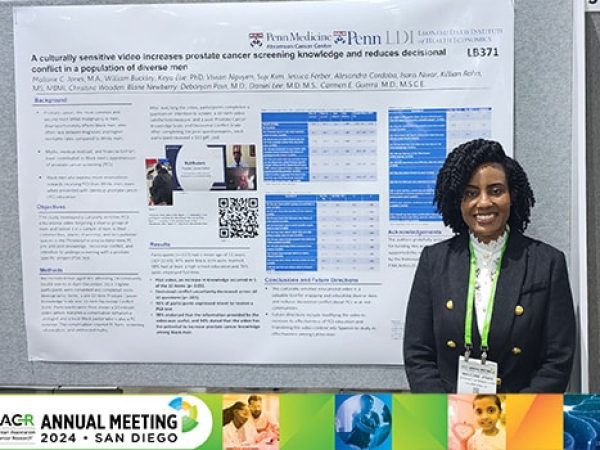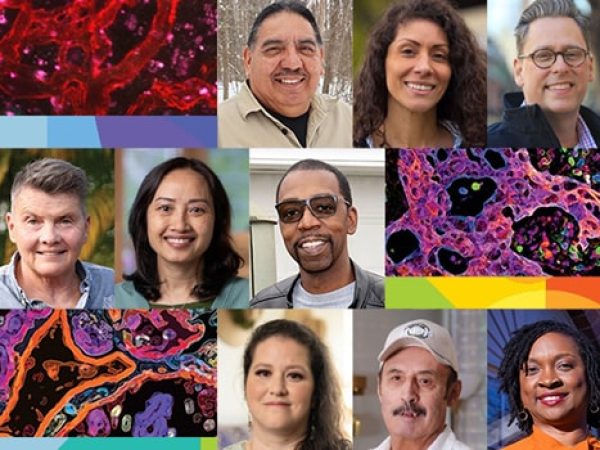World Cancer Day: AACR’s Efforts to Close the Care Gap
This World Cancer Day, an initiative of the Union for International Cancer Control (UICC) that annually falls on February 4th, the UICC is asking people to join them in encouraging governments around the world to promote health equity, enhance care accessibility, and reduce disparities in cancer incidence and mortality. The theme, for the third and final year, is UICC’s campaign to “Close the Care Gap,” which in year one focused on recognizing the issues in cancer disparities, in year two encouraged like-minded people and organizations to form alliances around acting to address these issues, and now is asking people to take the message of change to government leaders to eliminate health inequity and its root causes.
In 2022, there were an estimated 20 million new cancer cases around the world, and that number is expected to grow by 77% to over 35 million in 2050, according to the latest data released by the International Agency for Research on Cancer (IARC), which is the cancer agency of the World Health Organization (WHO). The data, which was released ahead of World Cancer Day, also revealed the proportional increase of cancer incidence will be most drastic in countries with a low (142% increase) or medium (99%) human development index (HDI), a compiled statistic used to measure a country’s social and economic development. Further, cancer mortality in these countries is projected to almost double in 2050. Meanwhile, WHO also published survey results from 115 countries, which found that only 39% of participating countries covered the basics of cancer management as part of their financed core health services for all citizens.
The UICC also released its annual World Cancer Day 2024 Equity Report, which features perspectives from past and current UICC board members around the world about the issues their countries face and recommendations on how to solve them.
For example, one representative explained that in Australia—where bowel cancer is the second leading cause of cancer-related deaths—only one in five eligible people participate in the bowel cancer screening program.
In Jordan, which has one of the most advanced health care systems in the Middle East and North Africa region, socioeconomic disparities have led to unequal access to health insurance—with more than a quarter of the national population without coverage. Plus, underprivileged populations, such as Syrian refugees, have poor access to health care with one study finding that breast cancer is often found late in these refugees when they have a more advanced-stage disease.
Meanwhile, patients in Kenya and similar low- and middle-income countries (LMICs) are also frequently diagnosed with cancers at advanced stages because of factors such as cost and inadequate knowledge among health workers about early signs of cancer.
The American Association for Cancer Research (AACR) shares the UICC’s goal to address disparities in cancer care like these around the world and help close the care gap and has several programs and initiatives in this area, including:
The AACR Cancer Centers Alliance
In September 2023, the AACR announced the formation of the AACR Cancer Centers Alliance, which brings together the nation’s cancer centers to help expand the scope and impact of world-class institutions for the benefit of all patients across regions and diverse populations. The Alliance was formed to make it easier for these leading centers to collaborate. The Alliance is initially focusing on four main areas: 1) basic and translational research; 2) clinical research, clinical trials, and regulatory science and policy; 3) education, training, professional advancement, and diversity, equity, and inclusion; and 4) speaking with a unified voice.
AACR Project GENIE
AACR Project GENIE, an open-source, international, pancancer registry of real-world data assembled through data sharing between a cohort of leading international cancer centers, is also helping improve collaboration and working to address disparities in health care data. In 2023, AACR Project GENIE announced four new participating institutions chosen to expand the diversity of the patient data in the registry. The addition of genomic data from Children’s Hospital Los Angeles, Louisiana State University Health Sciences Center New Orleans, Korean University Anam Hospital, and University of Miami Sylvester Cancer Center will increase representation of pediatric, East Asian, Creole, Acadian, Hispanic, Black, and low-income patients.
Examining Disparities in Racial/Ethnic Minorities and the Medically Underserved
The 16th AACR Conference on the Science of Cancer Health Disparities in Racial/Ethnic Minorities and the Medically Underserved, held September 29-October 2, was organized in association with the AACR Minorities in Cancer Research Council. The event convened more than 750 scientists, clinicians, health care professionals, cancer survivors, and patient advocates in Orlando, Florida, to discuss topics including how to realize the goals of the Cancer Moonshot, targeting cancer in Indigenous communities, and achieving diversity in clinical trials. Additionally, conference cochair Sophia H. L. George, PhD, and Camille C. R. Ragin, PhD, MPH, chaired a special session that explored how recently passed laws in Florida and other states banning funding for the promotion of education about diversity, equity, and inclusion impact the cancer workforce. Luis G. Carvajal-Carmona, PhD, and Chanita Hughes-Halbert, PhD, joined the chairs in outlining strategies that universities and medical schools can use to advance equity among their students and faculty while complying with these regressive laws.
The 11th Annual Symposium on Global Cancer Research
From April 4-6, 2023, the AACR organized the 11th Annual Symposium on Global Cancer Research, a virtual satellite meeting of the Consortium of Universities for Global Health’s 14th Annual Global Health Conference. The symposium was formed in collaboration with the U.S. National Cancer Institute Center for Global Health, American Society of Clinical Oncology, USC Norris Comprehensive Cancer Center, UCLA Jonsson Comprehensive Cancer Center, Partners in Hope Malawi, City of Hope Comprehensive Cancer Center, Fundación Instituto Leloir-CONICET, and the Republic of Zambia Ministry of Health. The theme was “Closing the Research-to-Implementation Gap,” and symposium abstracts were published along with a commentary in a special online-only supplement to the AACR journal Cancer Epidemiology, Biomarkers & Prevention.
Diversity in Clinical Trials
The AACR is also working to help improve diversity in clinical trials through various initiatives. The Robert A. Winn Diversity in Clinical Trials Award Program, established in 2021, is a collaboration between the AACR and Virginia Commonwealth University and funded by the Bristol Myers Squibb Foundation to train 250 community-oriented clinical trial investigators by 2025. The program also includes an annual workshop, with the 2023 iteration, held last November, focused on educating participants about clinical trial design and research practice; highlighting the benefits of focusing on clinical research, specifically in underrepresented populations; and investigating the disconnect between communities and clinical trialists.
Additionally, the AACR helped educate attendees of the AACR Annual Meeting 2023 about the U.S. Food and Drug Administration’s (FDA) April 2022 guidance on diversity action plans to improve enrollment of participants from underrepresented racial and ethnic populations in clinical trials, which became law in December 2022. The AACR convened three workshops for leaders of oncology therapeutics companies to discuss best practices for integrating diversity action plans into their clinical development strategies as well as a special symposium on the subject.
AACR Grants Program
In 2023, the AACR Grants Program offered 25 grants totaling more than $6.38 million to support meritorious scientists from diverse backgrounds who are underrepresented in the cancer research community—including women, individuals working in low- and middle-income countries, and members of racial or ethnic minority groups.
AACR on Campus
Additionally, the AACR continues to support young investigators at research institutions in low-resource settings through its AACR on Campus overseas outreach program. Launched in 2021, the program aims to advance international collaboration by providing education and training in cancer research innovations, scientific publishing, science communication, research integrity, and career development. Last year, the AACR partnered with the Advanced Centre for Treatment, Research, and Education in Cancer (ACTREC) to offer three scientific sessions in Mumbai, India focused on lung, gastrointestinal, and breast cancers. In 2024, AACR on Campus Brazil is partnering with The Institute of Cancer of São Paulo and Universidade de São Paulo to host three events the week of February 19th in São Paulo and Ribeirão Preto. AACR on Campus is working to include more locations to further spread education and training for additional young investigators.
These initiatives and programs, among others, are core to the AACR’s mission to advance cancer research around the world to help prevent and cure cancer. Further, it aligns with the UICC’s three-year campaign to Close the Care Gap through awareness, collaboration, and action. The AACR will continue to work with its more than 58,000 members residing in 141 countries and territories around the world until this mission is achieved.

